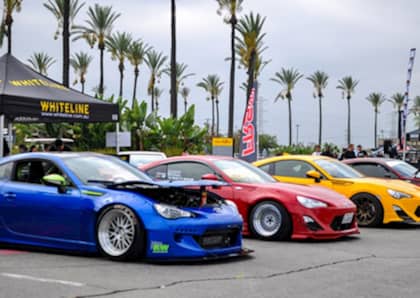Use the E-Force: Edelbrock Supercharger for the Scion FR-S/Subaru BRZ
It’s no secret that, while the FA20 motor found in either the Scion FR-S (soon to be Toyota 86) or Subaru BRZ are fun to mash on, they aren’t the most powerful. Because of their high-compression design, it’s important to take care when adding forced induction—but that doesn’t mean you can’t. Popular methods to employ forced induction on the FA20 include turbocharging and supercharging (haven’t seen too many using nitrous, so we’ll leave that out here), of which there are several kits already on the market. With years of expertise R&D’ing its own line of E-Force supercharger kits for the domestic market, Edelbrock is beginning to dip its feet back into the world of imports with an E-Force kit for the FR-S/BRZ. The power is modest and reliable, and Edelbrock has seen various stages of the kit make really good power—but in its most basic offering, the kit is good bang for the buck, made with high-quality components, right here in the U.S.

We visited Edelbrock’s massive Southern California–based headquarters to learn more about its E-Force supercharger line and to see how to install one on a FR-S (our subject happens to belong to our good friend, Janet Fujimoto), which isn’t as difficult as one might imagine, but requires a good two to three days to complete, depending on your mechanical skill level. The Edelbrock E-Force kit comes with every piece of hardware and software required to install, and recently received CARB certification, making it 50-state street legal. Edelbrock’s installation instructions are very thorough, so use this as a general visual guide to tackling the areas of importance.
Installation:

1. Before installing any physical parts, the factory ECU will need to be reflashed, using the supplied EcuTek equipment. There are very explicit instructions on how exactly to do this, but the most important reason why this needs to be done first is because it’ll optimize the entire system for this supercharger kit, and you must send the upgraded Dongle ID and License Key to Edelbrock to have the revised calibration file completed, of which there is a three- to four-day turnaround time—so plan accordingly. Having basic laptop tuning experience will come in handy but is not mandatory, nor is it too difficult to navigate with the provided instructions.

2. Once the ECU has been programmed, you can get started on installing the supercharger. Remove any fuel pressure present within the fuel lines and disconnect the negative battery terminal.

3. Remove the front bumper, lower splash guard and carefully disconnect the side-marker lenses.

4. Drain the radiator fluid. You don’t need to use a rubber hose or bucket, but these will make a cleaner job all around.

5. Now comes the fun part: taking more of your engine parts off. Pull the factory air box, noise generator and intake tube.

6. Remove the manifold cover from the intake manifold.

7. Loosen the tensioner (clockwise) and remove the drivebelt.

8. From the passenger side, remove the ECU mounting-plate assembly so you can access the fuel rail for removal. Inspect your injectors to ensure the O-ring seals are there—if not, carefully pry them using a small flathead screwdriver, as they’ll need to be reused or replaced if damaged. From the driver side, do the same procedure and inspect the O-rings. You’ll also be removing the low-pressure fuel-feed line and saving it for later.

9. Unbolt the throttle-body from the intake manifold, but don’t disconnect the coolant lines yet. Remove the engine harness from the rear passenger-side manifold runner and remove the bolts securing the intake manifold to the cylinder heads.

10. Carefully tilt the manifold forward and unplug the blue EVAP connector, then carefully remove the intake manifold. An extra set of hands will be helpful here.

11. Clean the cylinder-head flanges and cover the intake ports with protective tape to prevent any debris from falling into the ports.

12. Manual-transmission-equipped FRS owners will need to flip and clock the rubber hydraulic line to clear the manifold assembly. Route the clutch line underneath the heater hoses and position the clutch line so it’s pointing downward and clocked toward the driver side. Fill the clutch reservoir to the MAX line with FMVSS No. 116 DOT3 brake fluid or equivalent. (Note: During the clutch-bleeding procedure, don’t let the clutch fluid level go below the MIN line in the reservoir.) You’ll be removing old fuel lines and adding new ones, so please reference Edelbrock’s detailed instructions for specifics.

13. One great thing about the E-Force kit is that Edelbrock supplies everything that’s needed to complete the install, including all the relevant hoses. Edelbrock’s instructions will also tell you which require trimming, as needed.

14. Next, it’s time to position the heat exchanger in front of the radiator. You’ll know the piece better by its more well-known name: the intercooler. It’s secured using the same bolts that secure the A/C condenser to the radiator assembly. Speaking of which, the compressor also needs to be positioned forward.

15. Installing the heat exchanger/intercooler hoses to the supercharger will be easier if you do this before lowering it on top of the cylinder heads, even though Edelbrock’s instructions don’t say so. Save yourself a little bit of headache.

16. Pretty sick supercharger, right? This is all made in-house, and the quality is outstanding.

17. Pull the factory intake-manifold gaskets, clean and inspect them or replace if needed. They’ll be used on the supercharger intake flange.

18. Now it’s time to put the supercharger in place. Don’t forget to pull the protective tape covering the cylinder-head ports. Route the hose to the intercooler and secure with the supplied hose clamp.

19. Attach the supplied surge tank to the other end of the hose and secure it with a hose clamp. You’ll also secure the surge tank to the surge-tank bracket after that’s mounted under the fuse box.

20. Remove the throttle-body O-ring seal from the factory manifold, cut the tip off (yes, just the tip) and install the O-ring seal onto the supercharger throttle-body flange. Reinstall the factory throttle-body with the connector facing up.

21. Connect the throttle-body extension harness to the throttle-body connector and throttle-body. Secure the throttle-body coolant outlet hose to the throttle-body outlet fitting.

22. Install the supplied supercharger drivebelt using the diagram outlined in Edelbrock’s instructions. Use a 14mm socket to rotate the belt tensioner clockwise.

23. You’ll need to relocate the DRL resistor to mount the new water pump. Once mounted, connect the appropriate hoses and secure the harness.

24. The Edelbrock air box installs in a few different steps. First, install the grommet spacer on the front shroud. Next, lift up the upper radiator support and insert that piece until the lip of the air duct protrudes past the insulator foam above the A/C condenser.

25. Use the supplied K&N grease to fill the channel of the air filter. This will keep debris from bypassing the filter and being sucked into the rest of the system.

26. Install the K&N filter into the front air box shroud.

27. Place the rear air box shroud over the front air box shroud with the barb fitting on the driver side.

28. Slip the MAF housing onto the throttle-body and air box. Rotate the clamps so the screws are positioned away from the A/C compressor belt/pulley; there should be roughly 6mm of clearance. You can then tighten up the rear air box shroud and connect the MAF sensor. Replace the factory bumper and double check your work for any missed connectors and the like.

29. Refill both the radiator and supercharger cooling system with a 50/50 mixture of coolant and water. Then follow the instructions for priming the intercooler system.

30. Again, it’s imperative you have the EcuTek ECU reflashed prior to installing any of the hard engine parts, so if you haven’t: STOP RIGHT HERE and DO IT! If you have, turn the ignition on, but don’t start the vehicle—push the start button twice without pressing down on the brake pedal.

31. Check for any leaks around the fuel rails, injectors and fuel fittings. If there are any, shut the ignition off immediately and repair them before moving on.

32. If there are no fuel leaks present, you can check to see that the water pump is functioning and water is cycling through the surge tank. Start the engine and let it warm up to operating temperature. Check for any coolant leaks around the throttle-body and intercooler hoses. Turn the engine off and recheck all fluid levels when it’s safe, and top off as needed.
Final Notes:
After installing the E-Force kit, Edelbrock strapped the FR-S to its dyno and was able to produce 230 whp with 191 lb-ft of torque (stock numbers are 166 whp with 131 lb-ft). This particular car had horsepower gains that are a bit lower than other cars Edelbrock has dyno’d but this kit is using the CARB tune. With a built bottom end or smaller pulleys, the kit has room to produce a lot more power.
Info: Edelbrock, www.edelbrock.com, 800-416-8628











